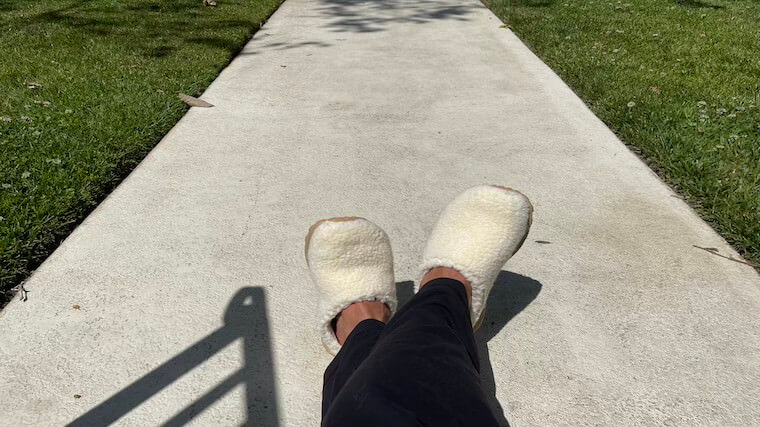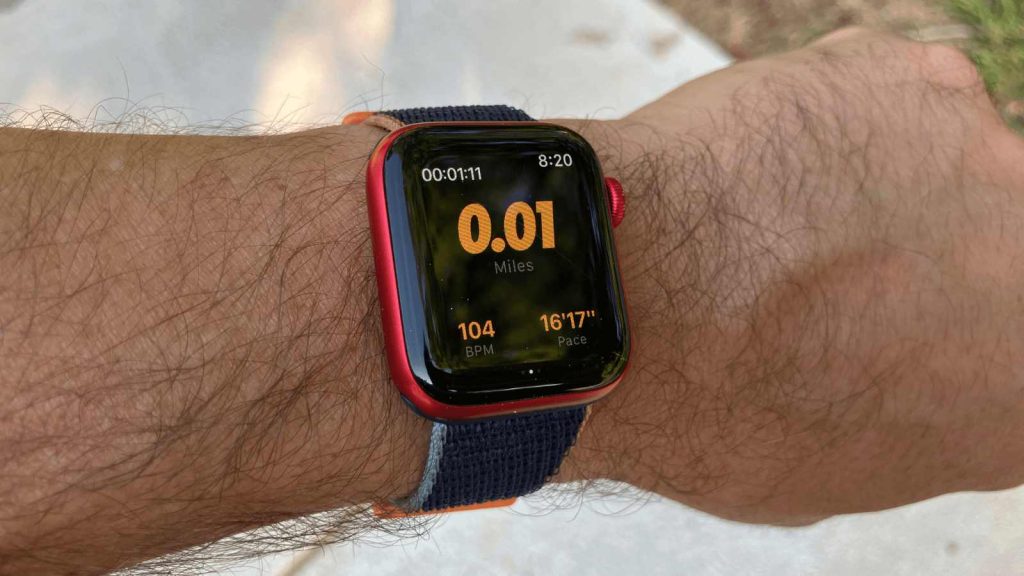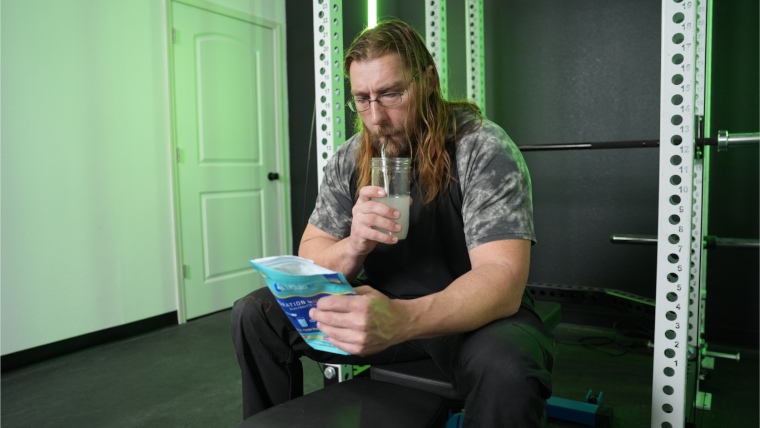The holiday season can be an enjoyable time of year. Taking in the festivities, chowing down on delicious food, spending time with family members and loved ones — you know the routine. However, the holidays can also be an anxious time for health and fitness, with plenty of opportunities to skip the gym, overindulge on holiday foods, and stress over such thoughts as getting the perfect gift, reflecting over the past year, or dreading the uncertainty of a new 365 days ahead. (1)
Thankfully, there are plenty of ways to manage holiday stress and ensure your health goals stay celebrated well into the new year. We consulted with three experts to curate this guide to helpful holiday health tips covering categories including diet, physical activity, mental well-being, and more. With these insights, you can more easily mark the “most wonderful time of the year” as a healthy holiday rather than a nightmare you’d like to forget.
Be Kind To Yourself
Okay, so maybe you got into the sweets too much at your company’s holiday party. Perhaps you spent a little too much on family gifts. The gym? Pfft, you’ve been so caught up between gatherings and shopping that you’ve forgotten what a treadmill even looks like. There can be a variety of moments that can have you feeling down about yourself around the holidays, but the important thing to remember is this — it’s OK!
“There’s no need to dwell on what you could have done differently — what matters is how you respond now,” says Dr. Mona Kirstein, Ph.D. “The power to reset is always in the present moment, so take a deep breath and focus on nourishing your body and mind.”

Take a moment to slow yourself down and decompress — choose your favorite sitting location and make yourself as comfortable as possible. Recognize that what you’re feeling isn’t a unique circumstance and that everyone goes through a similar struggle at some point. Be curious about your stress but without judgment. This can help you reconnect to the present and make a more efficient plan for the future.
Hydrate
Another healthy habit to focus on around the holidays is hydration. Keeping your water stores at a proficient level can help keep your energy levels up, support digestion and cognitive function, and help eliminate that sluggish feeling you get after consuming indulgent meals. (2) Now, this isn’t to say you can’t indulge in seasonal specialties like eggnog or alcoholic beverages, but it’s best to have a plan before the glasses hit the table or you clink in cheers.
First, try and set a limit before drinking commences. Feel free to spread out your indulgence, too, by having water, tea, or coffee (within moderation, of course) in-between your treats as you socialize with friends, coworkers, and family members.

Hydration should also be top of mind during the rat race of shopping season. Bring your best water bottle during trips to the store and sip as you power through the aisles. There’s no clear-cut recommendation on daily water intake, but most studies suggest that four to six glasses of water daily can be a good rule to follow for the general healthy population. (3)
Somatic Exercises
Struggling to find balance amongst the holiday eating, shopping, and socializing? Consider some somatic exercises to help you bring balance back to your psyche. These holiday season training tips, according to Dr. Mona Kirstein, Ph.D., are “movements that help you reconnect with your body on a deeper level.”
“Simple actions like slowly rolling your shoulders, swaying, or even massaging areas where you feel tension can remind your body that it’s safe to release and restore balance,” Kirstein adds. “Let go of the urge to ‘fix’ yourself with quick unnatural solutions — your body knows how to balance itself when you create the space for it to do so.”
Somatic exercises don’t need to be a major portion of your daily schedule, but instead can take as little as a few minutes. Some common somatic exercises include the following:
- Diaphragmatic Breathing: Taking slow, deep breaths using the diaphragm and abdominal muscles
- Body Scanning: Bringing attention to how specific areas of your body are feeling in a given moment.
- Grounding: Placing your attention on sensory-based sensations in an effort to slow down and reconnect with the present.
- Progressive Muscle Relaxation: Systematic tensing and relaxing of specific muscle groups as you become aware of different sensations within certain areas of your body.
Sensory Grounding
One somatic exercise that can be used widely throughout the holiday season is sensory grounding. Dr. Mona Kirstein, Ph.D., tells BarBend, “It’s a simple way to slow down and reconnect with the present moment. For instance, when everything feels chaotic, pause for a moment. Feel the warmth of your coffee mug, notice the smell of cinnamon or pine, or really listen to the sounds around you. Using your senses to come back to the moment can help your body and mind slow down, even when the holiday rush is in full swing.”
Sensory grounding can also be a healthy choice during this season as it can be done practically anywhere. There’s always room to pause and regain that sense of connectivity and the holidays are, in fact, on your schedule.
Listen To Your Body
There are perks to listening to your body outside of training. Being in tune with yourself physically, mentally, and emotionally can be a beneficial way to manage expectations, commitments, and feelings around the holidays.
For example, if you know you have a slew of gatherings scheduled for a Friday afternoon and evening yet are stressing over the potentially limited healthy eating options, temptations for splurges, and hours of sleep lost due to being out socializing, take the time to think about what suits your needs best and reconsider your plans.

Perhaps making two events instead of three will best fit your schedule. Establishing a curfew, packing personal healthy snacks, or even turning down some commitments can also be strategies that give you control of your situations.
“Listening to these signals can help you make decisions that honor your well-being,” adds Dr. Mona Kirstein, Ph.D. “Keeping you more balanced and less overwhelmed throughout the season.”
Rest
As you’re making your list and checking it twice this season, one item should always be at the top — rest. Studies report that getting the proper 7 to 9 hours of sleep each night can help bolster cognitive function, mental well-being, muscle recovery, and more. (4)(5) However, it’s important to remember that rest can also describe taking a break between activities.
Think about your holiday schedule — it’s likely hectic with trips to the store, parties, recitals, and other timely events. Rather than going into autopilot and trudging from one activity to the next, remember to schedule some personal time to recharge and return to center. “Prioritizing restful sleep and making time for a walk in nature can also do wonders for mental clarity and overall well-being,” adds Dr. Ruby Lathron, Ph.D.
Other activities can include setting aside time in the morning for a healthy breakfast, resting for a few minutes in-between shopping sprees, or decompressing in the evening with a good book or your favorite holiday movie. However you choose to wind down is up to you, but always be sure to make sure there’s some time for recuperation within your daily regimen.
Say ‘No’
You can think of your holiday schedule as sort of a HIIT workout — too many commitments or “intervals” can leave you spread too thin. Plus, as you’re working through responsibilities, have you made time to catch your breath, grab a drink, or even pause to recollect yourself? Just like a workout session doesn’t need to include every exercise under the sun, you can have a holly jolly holiday without committing to every event or task set in front of you — it’s OK to say no.
“Saying no to things that don’t align with your well-being or that feel like too much can actually help you protect your energy and enjoy the season more,” says Dr. Mona Kirstein, Ph.D. “It’s about honoring your limits and knowing that balance comes from within, not from doing it all.”
Online health coach Angelica Ventrice also points out that setting realistic expectations and avoiding overcommitting yourself can be a great practice to get into for the sake of your well-being. “Boundaries are a huge part of decreasing stress and burnout,” she adds.
While it can be difficult to say no to a holiday party invite from a dear friend, or load your plate with healthy foods while everyone else is scarfing down seasonal treats, saying no can be a positive influence on your healthy lifestyle. You deserve to enjoy the season, too, after all.
Mindfulness
Mindfulness, according to studies, is defined as the awareness that arises when paying attention to the present moment nonjudgmentally. (6) With so much going on around, achieving and maintaining mindfulness can seem impossible at times. Fear not, though — you can balance this awareness and enjoy this time of year with just a few practices.
One such method of maintaining mindfulness around the holidays is by creating an “energy flow” that can help you sustain energy throughout the day rather than burning out from holiday fatigue.
Dr. Mona Kirstein, Ph. D., states, “One unique way is to tune into your body’s natural rhythms. For example, give yourself a moment in the morning to gently wake up your body with some movement or breathing exercises. This sets a foundation for steady energy throughout the day. Focus on what feels energizing, not just what you think you ‘should’ do.”

Kirstein also notes that keeping this energy flowing can help prevent your body from running on autopilot in-between tasks. Pausing between events or responsibilities, becoming aware of the present moment, and taking the time to mindfully transition into the next task can help you maintain a level-headed sense of the season.
Additionally, breathwork can be a perfect mental health tool, along with meditation, to help you master your mindfulness during the hustle and bustle of the holidays. Speaking from experience, online health coach Angelica Ventrice states, “To manage stress during the holidays, I stick to my regular daily health routines which includes morning meditation, grounding, breathwork and journaling. Sometimes all of them, sometimes two of them but I always meditate without fail because I believe it is the main antidote to stress.”
Unplug
A time-honored, American tradition around the holidays is binging your favorite movies and television specials in a marathon fashion. However, all that screen time, accompanied by the time spent on your phone texting colleagues and scrolling the internet for deals on gifts, can lead to physical, psychological, social and neurological adverse consequences. (7) As such, taking some time to unplug during this time of year can be a helpful way to rest and recharge.
Dr. Ruby Lathon, Ph.D., claims that planning a “digital detox” day amongst the seasonal festivities can be perfect for regaining a sense of presence and awareness. “I love taking time on the weekend to make a nourishing plant-based meal and share it with friends or family, creating a warm, loving atmosphere. This practice allows you to slow down, enjoy the moment, and focus on connection, which is key for emotional and mental well-being.”
Naturally, you can’t avoid the screen entirely given today’s day and age, but having a few evenings or days spent away from the blue light can prove to be the best gift of all this season.
Mindful Indulgence
A major potential stressor around the holidays lies in your eating habits. Those cookies, treats, and heavy dinner plates filled with casseroles, turkey, ham, and other sides could be too enticing to pass up. Rather than jump to the conclusion that eating around the holidays is a definite precursor to weight gain, you can practice what’s known as mindful indulgence or eating your favorite meals and snacks with awareness and intention.
“I always recommend enjoying your favorite holiday treats in moderation, but make sure they’re paired with nourishing, whole foods,” says Dr. Ruby Lathon, Ph.D. “For instance, if you’re having dessert, balance it with a light, plant-based meal before the treat that’s full of fiber and nutrients and will help blunt blood sugar spikes. That way, you can enjoy the indulgence without feeling sluggish or overdoing it.”
[Related: Holiday Diet Survival Guide]
Another method to practice mindful indulgence instead of overeating is to pick and choose where you want to savor the flavor. Narrow down your personal menu to two or three favorite treats and dishes and fill the rest of your appetite with more wholesome alternatives such as lean proteins, veggies, fruits, and (of course) water.
Mindful indulgence also doesn’t mean forgoing meals and calories in an effort to save up points for the party or gathering. Online health coach Angelica Ventrice notes that this can actually work against your intentions, often leading to overeating and a sense of irritability due to off-kilter blood sugar levels. “Instead, eat balanced meals throughout the day with plenty of protein, and fiber,” she adds. “This will keep your blood sugar stable and help you enjoy holiday meals without the urge to overindulge.”
Other Helpful Holiday Tips
There’s more than one way to wrap a present, and there are even more ways to help ensure your upcoming holiday is the healthiest yet. In addition to the aforementioned holiday health tips, you can also prioritize your training and nutrition through the following means.
When it comes to workouts and holiday season training tips, we understand that schedules aren’t necessarily built around the gym or training center. Remember, though, that a session doesn’t need to be an hour-long endeavor — even just a few minutes of motion can be enough to maintain performance. “Focus on consistency over duration. Something is better than nothing, that is my stance,” says online health coach Angelica Ventrice. “Staying active, even in small bursts, helps combat holiday stress and keeps you feeling great.”

Additionally, it can be wise to think about your alcohol consumption during this time of year. This may be the lone time of the year where you celebrate with libations, but always ensure that you’re drinking in moderation. Compliment your spirits with a glass of water, and have a plan prior to indulging so you can stay in control all throughout your events.
Conclusion
The holiday season is intended to be a time of joy, happiness, and connecting with the ones we hold near and dear. With that, though, comes the opportunity to let our personal well-being slip to the wayside, turning this time of year into a season more dreaded than enjoyed. Thankfully, making a few key changes to your plan of attack and remembering to take care of yourself throughout the journey can help you regain that fun and festive spirit.
Keep the holiday blues at bay by keeping an eye on your personal status each day. If you’re overwhelmed or feel like you need a break from the rat race, take it! If holiday meals and tasty appetizers have you sweating your next get-together, have a plan beforehand and focus on treating yourself while also keeping your diet in balance. Find training windows when you can, use these holiday health tips for guidance, and above all else, enjoy this magical season that only pops up once a year.
Holiday Health Tips FAQs
How do I handle holiday stress?
Determining how to handle holiday stress can vary from person to person, but a good strategy to deal with this seasonal anxiety is by listening to your body and ensuring you’re keeping time for yourself. Take moments throughout your day to check in on your well-being and, if necessary, take a break to re-center your thoughts and bring everything back to balance.
How can I control my diet during the holidays?
One of the best ways to avoid overeating or throwing your nutrition off during the holidays is by creating a plan of attack before being presented with temptations. Give yourself room to enjoy a few treats or delicacies and then opt for different alternatives in-between like lean proteins, fiber-rich foods, and vegetables. Using smaller plates around meals can also be an effective way to manage portion control.
Can I drink during the holidays?
There’s a heightened aura around consuming alcoholic beverages during seasonal gatherings. If you do plan to drink, make sure to stay within moderation. Have a plan beforehand and we’d recommend trying to limit yourself to two alcoholic beverages, mixing in other hydrating drinks like water, coffee, or tea.
References
- Dumsch, A. (2024, December 8). Handling Holiday Stress. National Institutes of Health. https://oitecareersblog.od.nih.gov/2014/12/08/handling-holiday-stress
- Liska, D., Mah, E., Brisbois, T., Barrios, P. L., Baker, L. B., & Spriet, L. L. (2019). Narrative review of hydration and selected health outcomes in the general population. Nutrients, 11(1), 70. https://pmc.ncbi.nlm.nih.gov/articles/PMC6356561/
- LeWine, H. E. (Ed.). (2023, May 22). How much water should I drink a day?. Harvard Health. https://www.health.harvard.edu/staying-healthy/how-much-water-should-you-drink
- Helvig, A., Wade, S., & Hunter‐Eades, L. (2015). Rest and the associated benefits in restorative sleep: A concept analysis. Journal of Advanced Nursing, 72(1), 62–72. https://pubmed.ncbi.nlm.nih.gov/26370516/
- U.S. Department of Health and Human Services. (n.d.). How much sleep is enough?. National Heart Lung and Blood Institute. https://www.nhlbi.nih.gov/health/sleep/how-much-sleep
- Schuman-Olivier, Z., Trombka, M., Lovas, D. A., Brewer, J. A., Vago, D. R., Gawande, R., Dunne, J. P., Lazar, S. W., Loucks, E. B., & Fulwiler, C. (2020). Mindfulness and behavior change. Harvard Review of Psychiatry, 28(6), 371–394. https://pmc.ncbi.nlm.nih.gov/articles/PMC7647439/
- Lissak, G. (2018). Adverse physiological and psychological effects of screen time on children and adolescents: Literature review and case study. Environmental Research, 164, 149–157. https://pubmed.ncbi.nlm.nih.gov/29499467/